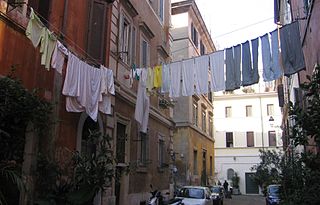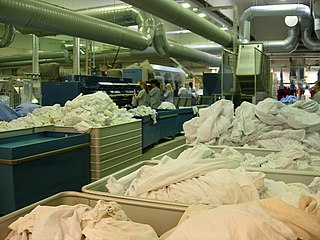
Laundry is the washing of clothing and other textiles, and, more broadly, their drying and ironing as well. Laundry has been part of history since humans began to wear clothes, so the methods by which different cultures have dealt with this universal human need are of interest to several branches of scholarship.

A washing machine is a home appliance used to wash laundry. The term is mostly applied to machines that use water as opposed to dry cleaning or ultrasonic cleaners. The user adds laundry detergent, which is sold in liquid, powder, or dehydrated sheet form, to the wash water.

A clothes dryer, also known as tumble dryer, is a powered household appliance that is used to remove moisture from a load of clothing, bedding and other textiles, usually after they are washed in a washing machine.

A clothes line, also spelled clothesline, also known as a washing line, is a device for hanging clothes on for the purpose of drying or airing out the articles. It is made of any type of rope, cord, or twine that has been stretched between two points, outdoors or indoors, above ground level. Clothing that has recently been washed is hung over the line to dry, held in place using clothes pegs or clothespins. Washing lines are attached either from a post or a wall, and are frequently located in back gardens, or on balconies. Longer washing lines often have props holding up the mid-section so the weight of the clothing does not pull the clothesline down to the ground.
Electrolux Laundry Systems, previously named Electrolux-Wascator, is a supplier of laundry equipment including washer extractors, dryers and finishing equipment. The company is a part of Electrolux Professional.

A car wash, or auto wash, is a facility used to clean the exterior, and in some cases the interior, of cars. Car washes can be self-service, full-service, or fully automated. Car washes may also be events where people pay to have their cars washed by volunteers, often using less specialized equipment, as a fundraiser.

Speed Queen is a laundry machine manufacturer headquartered in Ripon, Wisconsin, United States. Speed Queen is a subsidiary of Alliance Laundry Systems LLC, which billed itself as the world's largest manufacturer of commercial laundry equipment as of 2004.

A combo washer dryer is a combination in a single cabinet of a washing machine and a clothes dryer. It should not be confused with a "stackable" combination of a separate washing machine and a separate clothes dryer.

A drying cabinet is today usually an electrical machine designed to expedite the drying of items - usually clothing - that are unsuitable for a mechanical clothes dryer. Such items may include delicate clothing care labeled as "hang dry", "dry flat" or "do not tumble dry" on their wash instructions, as well as items such as comforters, boots and coats.

A Fantastic Fear of Everything is a 2012 British horror comedy film starring Simon Pegg, written and directed by Crispian Mills with Chris Hopewell as co-director. It is based on the novella Paranoia in the Launderette by Bruce Robinson, writer and director of Withnail and I. It has been described as a low-budget "semicomedy" about a children's author-turned-crime-novelist who has become obsessed with murder and murdering. It was released on 8 June 2012 in the United Kingdom and Ireland, and received a limited U.S. theatrical release on 7 February 2014. The BBFC classified the film a 15 certificate in the UK, while the MPAA rated the film R in America.

NightWash is a German television comedy show in which young artists and new stand-up comedy talents have the opportunity to perform in front of an audience with their program, typically lasting for 7–10 minutes. The series was created by, and is produced and presented by Klaus-Jürgen Deuser. The series made its TV debut on 14 October 2001 on WDR TV; it had existed as a live show since 2000. From 2007 until October 2009, it was broadcast on Comedy Central, and since November 2009, it has been aired on digital channel Einsfestival. The original series was set in a coin-operated laundrette in the Belgian quarter of Cologne.

The JLA Group is a provider of the distribution, rental and servicing of commercial laundry equipment, commercial dishwashers and regulatory compliance tools as well as Fire & Security Systems, Passive Fire Doors, Fire Risk Assessments, Automatic Opening Vents(AOV) . The company is the market-leading distributor of commercial laundry and catering equipment in the UK, having recorded circa 30 per cent market share in 2011. Founded in 1973, JLA is based in Ripponden, West Yorkshire, UK.
Alliance Laundry Systems LLC is a provider of commercial laundry systems. The company designs, manufactures, and markets a line of commercial laundry equipment under various brands in over 100 countries. Among the company’s products are washers, drying tumblers and ironers for the coin laundry, multi-housing laundries, institutional laundries and laundries for consumer residences. Alliance Laundry Systems manufactures products under the brands Speed Queen, Primus, Huebsch, IPSO, and UniMac. The company was founded in 1998 and is based in Ripon, Wisconsin. However, Alliance claims Speed Queens founding date of 1908 as the beginning for the company.
Laundroid was a laundry-folding machine and home robot, used to automatically wash, dry, iron, sort and fold clothes to a dedicated closet. It was dubbed to be the world's first laundry folding robot, and was planned to go on sale in Japan first, and subsequently, in a limited number, in the United States. Release date was set to 2017, with pre-orders starting in March 2017.
A laundromat (laundrette) is a self-service laundry facility.
A launderette (laundromat) is a self-service laundry facility.
Dhobi ghat or dhobighaat is used throughout south-central Asia to refer to any laundry-place or washing-place where many launderers or clothes-washers are present; they may be ordinary people or professionals who use the place to wash clothes and other linen. Mumbai has an extensive dhobi ghat known as Mahalaxmi Dhobi Ghat and there are several other dhobi ghats in Mumbai.

A laundry-folding machine or laundry-folding robot is a machine or domestic robot which folds apparel such that they can be stored compactly and orderly.
Poplin is an American company which allows people to hire independent contractors to wash, dry, fold, and deliver laundry. SudShare was co-founded in 2018 by Mort and Nachshon Fertel in Baltimore, Maryland, and operates through a mobile app of the same name. The service is available in over 400 American cities.
















